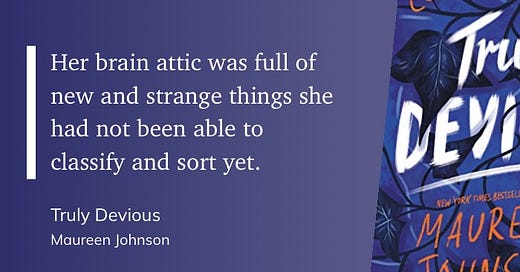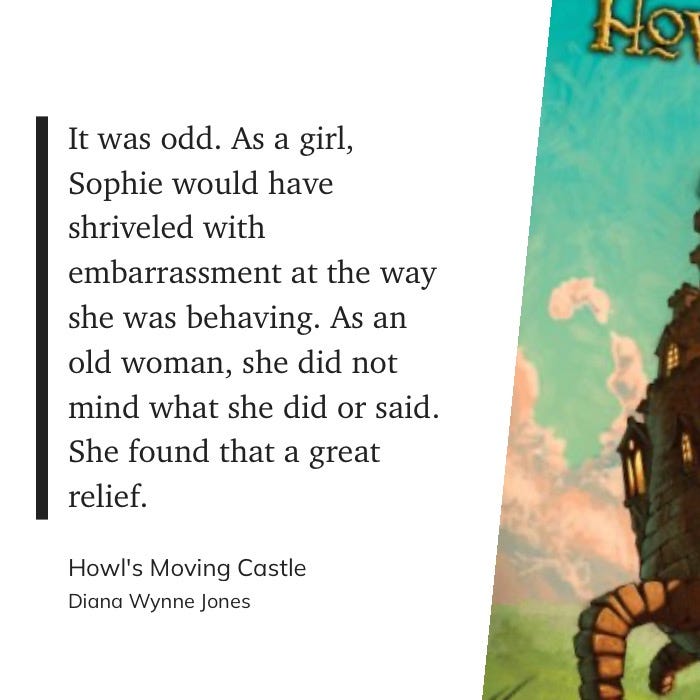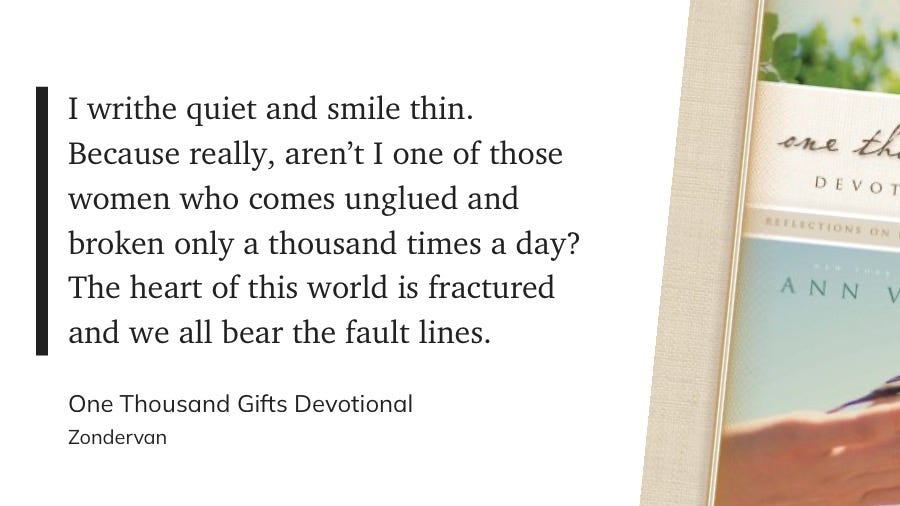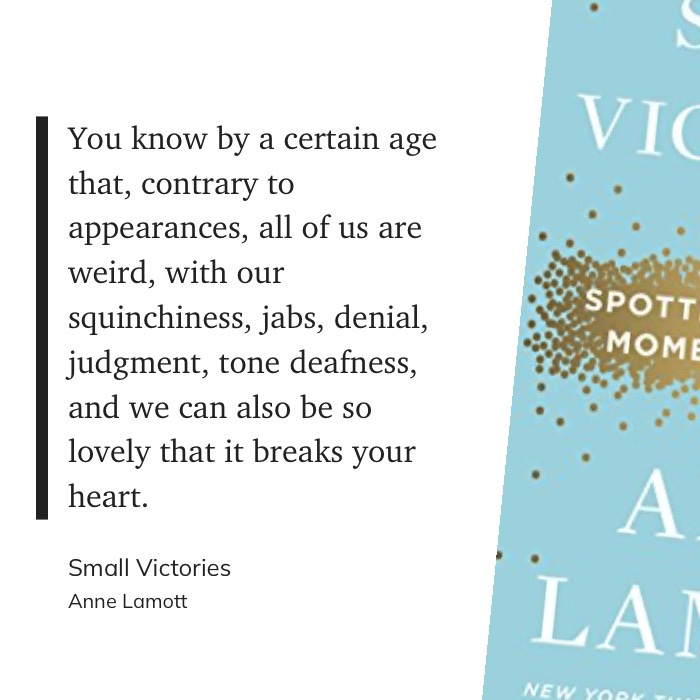I am going to do a podcast episode on this shortly, explaining the why’s and how’s and talking more deeply about how this all makes sense.
I am not ashamed of my new diagnosis, and what it entails, nor am I proud of it, holding it to me like my own golden egg and thinking it makes me more sparkly than thou. It just is, and it makes me make more sense. So there’s no reason not to share, now that I have dealt with it and learned about it for the past two months.
So I am going to start, as I am wont to do, with a book quote.
I am newly-diagnosed as autistic. Several different psychological tests and scales have confirmed it. I’ll speak at greater length on the podcast episode about them, and how they break down, and what the questions meant to me. My psychiatrist and I agreed that this is why my anxiety has never been fully addressed by medication and therapy. I have felt much less anxious just since receiving my new diagnosis, just since knowing why I am the way I am. The basic takeaway, for now, is that my language scores are neurotypical, and everything else is…not. I’ll explain in detail on the podcast, because I want to explore how deeply enlightening some of the questions were for me, for my past and my present.
I have carried around a great sense of relief for the past two months, and so I felt the need to share it. This is Disability Pride Month, and so here I am:
I have Ehlers-Danlos; I have POTS; I have major depressive disorder; and I have high-functioning adult-diagnosed autism. I also have secondary anxiety as a symptom of EDS, POTS, MDD, and autism. I use a cane at home and a wheelchair in public, and will be receiving my customized power wheelchair in about 60 days or so.
The gist of all of this is that the everyday details of life that some of y’all don’t even think about exhaust me. Both from the fatigue from EDS and POTS, and from the overexposure to stimuli from autism, which makes me feel like a turtle without a shell sometimes.
What does this mean for me on a daily basis? What have I been masking?
The short version:
I am horrible at small talk. I hate it. I don’t know what to say. I don’t know what’s appropriate to say. I have learned to fake it (which is called masking). But I feel foolish and embarrassed every single time, and I don’t know what to do with my hands or where to look and eye contact?! I feel goofy holding it and goofy not making it.
I hate talking on the phone, but. Not in that way that most of my Gen X people do, but I am actually unnerved by it, unless I really adore you. Then it’s comforting to hear your voice. I don’t feel like I know exactly when to take my turn, like I am interrupting no matter what, and that I can’t fully read your tone, again unless I really trust you.
I fully script my podcast. I am extremely good at reading aloud, so I would guess most people have never noticed. Makes having transcripts for my Patreon members super easy—already created. :) I have to do this, otherwise I might freeze up, even though I am talking about subjects I love and am fluent in. Why? Because I become aware that I am speaking to a large audience and choke up. This is where my physical disabilities and autism cross over—dysphasia and freezing. But if I have my own words to read, I can stay confident and on track. (What I mean is sometimes words won’t come out of my mouth—I know what I want to say, but it will not come out—and sometimes I know what I mean but the wrong words come out.)
Surprisingly, and against stereotypes, I am a hugger.
This is hard to admit: One thing that I didn’t realize until I took the diagnostic tests and read the literature is that one source of my anxiety is that I am afraid of not being seen and heard. On top of this, I am afraid of bothering people, of taking up too much space and time. I have always done a lot of self-talk around this to try to ameliorate the pain for myself. This embarrasses me as a 51-year-old, but it’s how my operating system was installed. I’m working on accepting this.
A gift of being autistic, I think, is how I write. I can just sit down and the story just evolves vividly and I get lost within in it for hours. No preparation work, no agonizing, no outlining. The outlining comes much later, to make certain everything is in line, which it usually is. I, as they say, have a rich inner life.
So. I cause myself much unnecessary pain, but it has given me gifts, including an intense capacity to love. I am wide open. If I care about you, I care about you. I remember what you are interested in, remember what you dislike and what bothers you—my memory is strangely strong. I can come across as pretty intense, then, but it’s just caring.
Actually, my memory can be a little spooky. My first memory is from infancy, which I know from my childhood psychology work is nearly impossible. I remember being in a stroller, being pushed next to someone who I understood to be small like me, and I knew my mom was behind me. We were walking past a white building with alternating doors colored maroon and navy blue. There was warm light and I was comfortable and content.
Mom has confirmed that those were our first apartment buildings, and that she often walked me with a fellow new mother on the sidewalks. However, we moved while I was still a baby, and we don’t have any photographs of the outside.
With this memory comes hyperfocus, as you see with my writing, but also with what I am interested in. I take notes on my reading, then research it further. So many commonplace books. I can converse for hours on strange subjects. I took post-graduate classes on sex crimes, forensic anthropology (I had charge of my own corpse; I need to write about her), and much more. I not only love horror movies, I know how they were created and how they are interconnected.
The last thing I can think about at this time (I’m emotionally worn out sharing all this) is that this explains why I never understood office politics. Several times I was reprimanded—or people gave each other side eye about me—because I followed instructions and missed hidden nuance. I’ll give examples on the podcast episode, but I would always be so baffled at work. We were all there to help people, as therapists, as mental health case managers—why are you all so worried about this nitpicky thing that is not even a violation of the rules? This is why I could never watch “The Office”; it stressed me out too much.
So. I’m different on top of being disabled. I process the world, especially the way humans interact, much differently than others do. Despite how much I enjoy making people laugh, I don’t often find funny what others do. I rarely watch or read comedies. I get secondary embarrassment for the characters. I always have, even with sitcoms. But I love “Mork and Mindy”, because my little brother, Eric, also did, and Mork reminds me of Eric. And “Pitch Perfect” is one of my favorite movies. Go figure.
Thank you for reading this. You may ask any questions you like. I am an open book, as I said.








